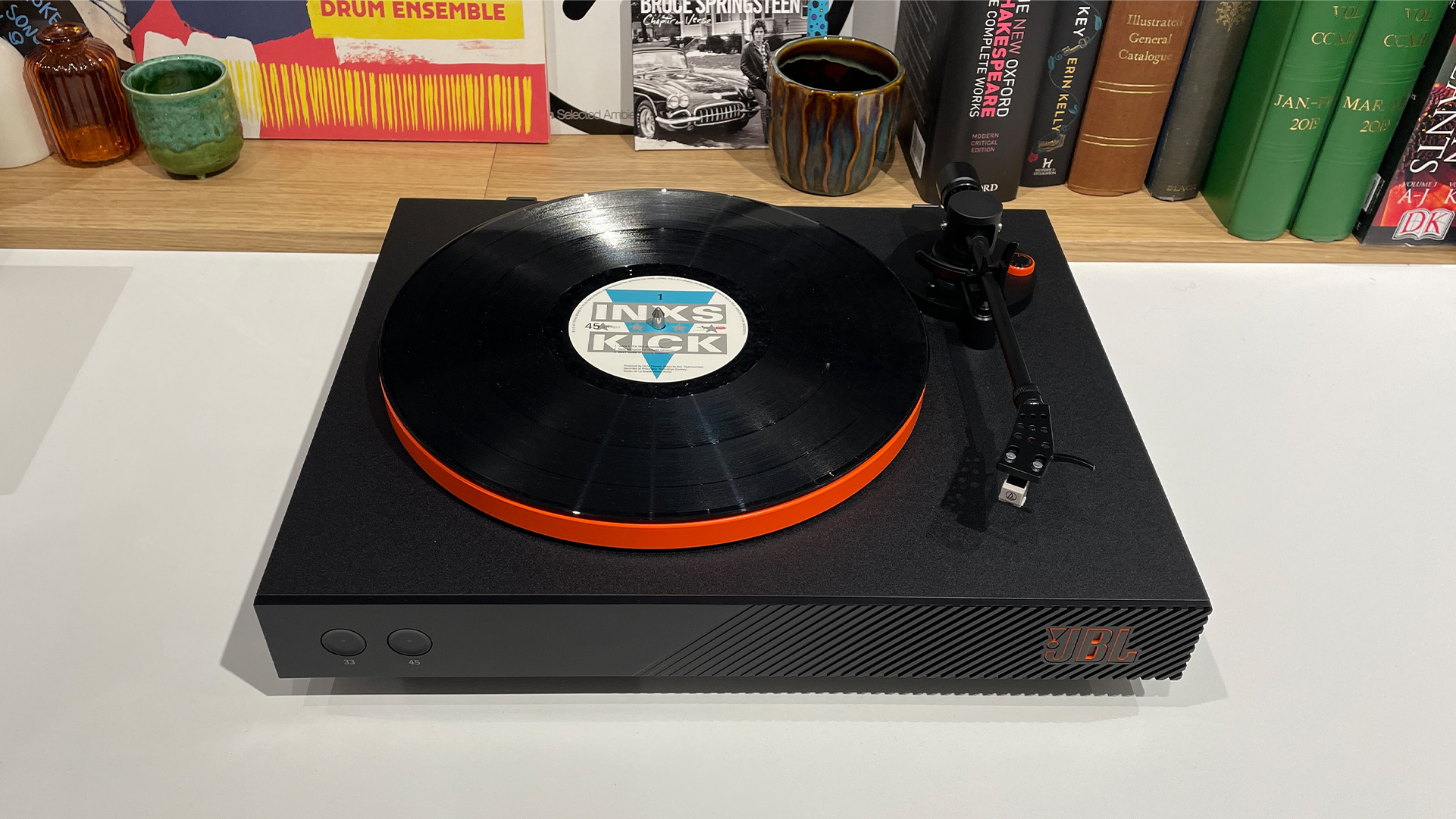What Hi-Fi? Verdict
If you want a turntable with the flexibility to serve you wirelessly, the JBL Spinner BT is an attractive and capable option
Pros
- +
Easy enough to set up
- +
Open, expansive sound
- +
Minimalist, attractive design
- +
Supports Bluetooth aptX HD
Cons
- -
Built-in phono stage can be bettered
- -
Not the last word in outright musicality
Why you can trust What Hi-Fi?
You can see why JBL has brought the Spinner BT turntable to market. In case you hadn’t noticed, vinyl is undergoing a bit of a resurgence which is partly being powered by a mix of nostalgia, dedicated events celebrating the format (like Record Store Day) and the fact several modern-day mega artists are now choosing to release their albums on the format.
We also know that modern Bluetooth products have never been more prevalent. There aren't many households in the land that don’t have at least one Bluetooth speaker lurking somewhere, while wireless headphones have become the default device through which most people now consume their music.
JBL has its feet firmly in both of these product camps so why not try and ride that vinyl wave? From what we can see, the only potential pitfall is that while JBL has a lot of speaker pedigree, it doesn’t have much experience in the world of turntables. Let’s see whether it hits the ground spinning with this Bluetooth turntable.
Design & build
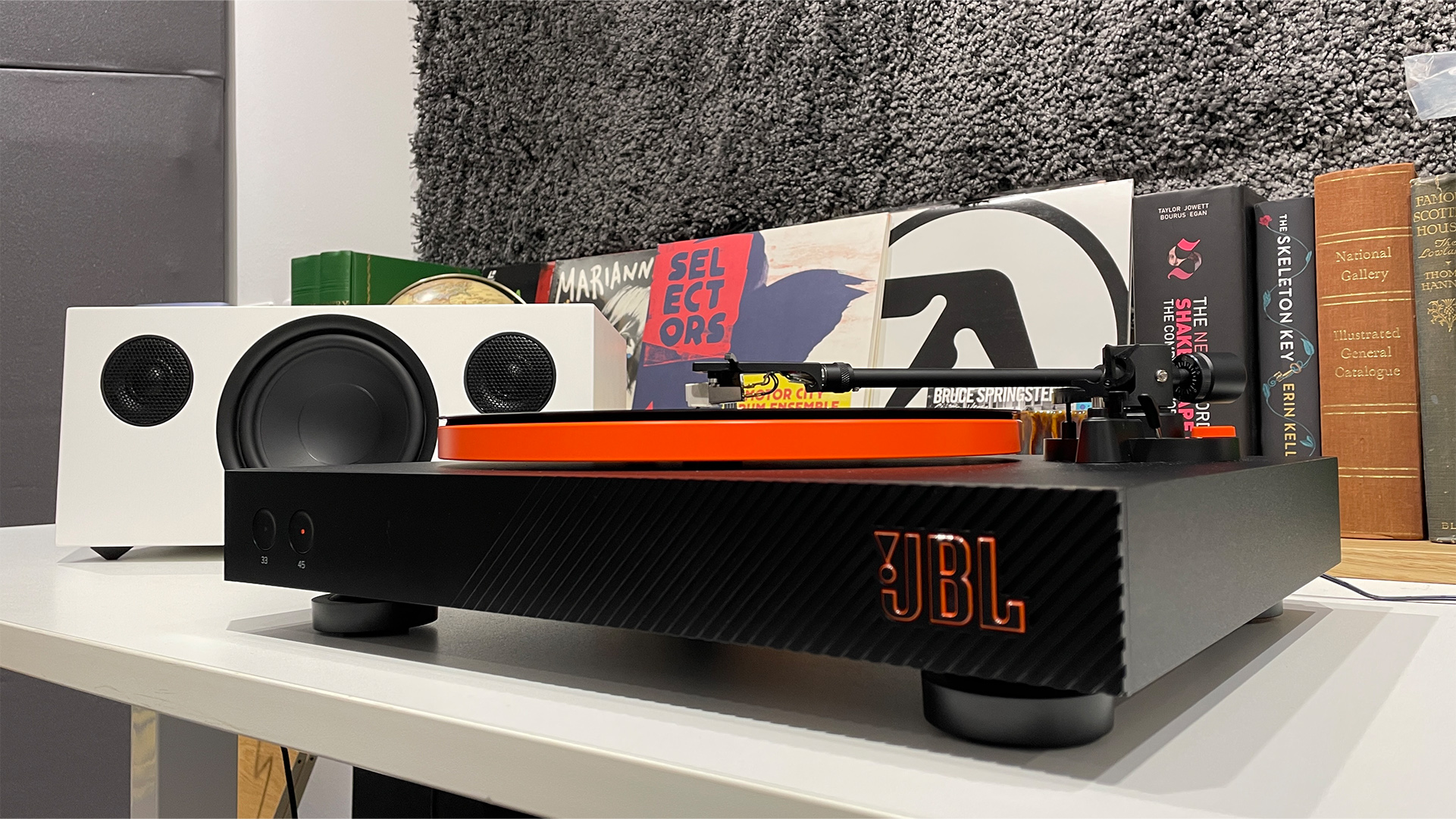
Just like JBL’s portable Bluetooth speakers, the Spinner BT gives off the vibe of a cool product that will be fun to use.
The unboxing process reveals three different sections: the plinth, platter and lid. Nestled inside the lid is a foam tray with all the pieces you need to put this turntable jigsaw together. You’ve got a handy quick start guide, a pair of phono cables to connect to your amplifier, a counterweight, an Audio-Technica AT3600L cartridge (which is already fitted and aligned to the headshell), a power supply and the hinges for the lid.
You’ll need to put in some effort to get the turntable up and running – but it’s not a particularly tricky or laborious set-up process. Instructions come in the box but we were also pointed in the direction of a video of how to set the Spinner BT up.
The JBL is belt-driven, and as you drop the platter on the central spindle you manipulate the belt around the motor pulley. Your life’s made easier via the small cutouts in the platter’s surface, allowing you to get a finger (or two) in position to help.
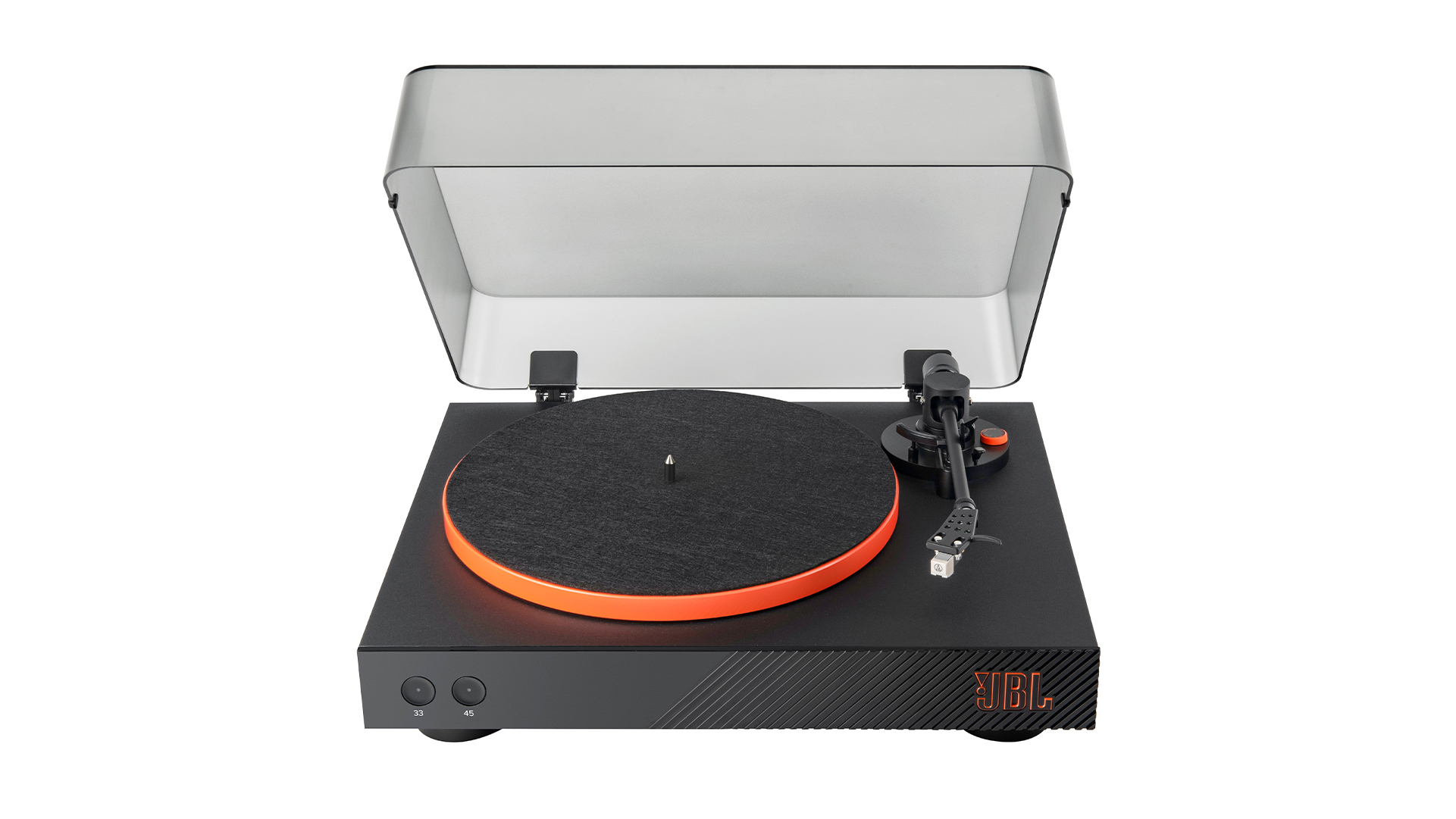
Type Belt drive
Operation Fully automatic
Speeds 33⅓, 45
Speed change Electronic
Cartridge Audio-Technica AT3600L moving magnet
Phono stage? Yes
Bluetooth? Yes, aptX HD
USB? No
Dimensions (hwd) 15.5 x 43.5 x 56.8cm
Weight 5.3kg
Finishes black/orange, black/gold
Audio-Technica’s AT3600L cartridge comes ready to rumble – the headshell slots into the arm and then you secure it in place by twisting the locking cuff. It’s unlikely anyone looking to buy this turntable will be thinking of upgrading, but at least the option is there should you want to.
Next up is the counterweight which slots onto the back of the arm – again, straightforward enough, although balancing the arm takes a bit of patience. From there it is a case of setting the counterweight dial to 0, rotating it a full turn clockwise to give a 3g tracking weight and then setting the anti-skate to match. Once this is done you should be good to go.
It’s not quite plug and play as some of the decks we’ve tested recently at the money, such as the Rekkord Audio F110. This deck has a fixed tracking weight and non-adjustable bias. It’s also fully automatic whereas the JBL is only partially automatic – it will stop playing when it gets to the end of the record, but the arm won’t automatically return to its original position.
The Spinner BT looks slab-like, but the consensus of our review team is there’s a sliver of style here too. The predominantly blacked-out finish gives it a stealthy appearance but multiple splashes of traditional JBL orange give it some character, notably from the all-orange aluminium platter and the edges of the raised JBL logo that adorns the right side of the fascia.
Features
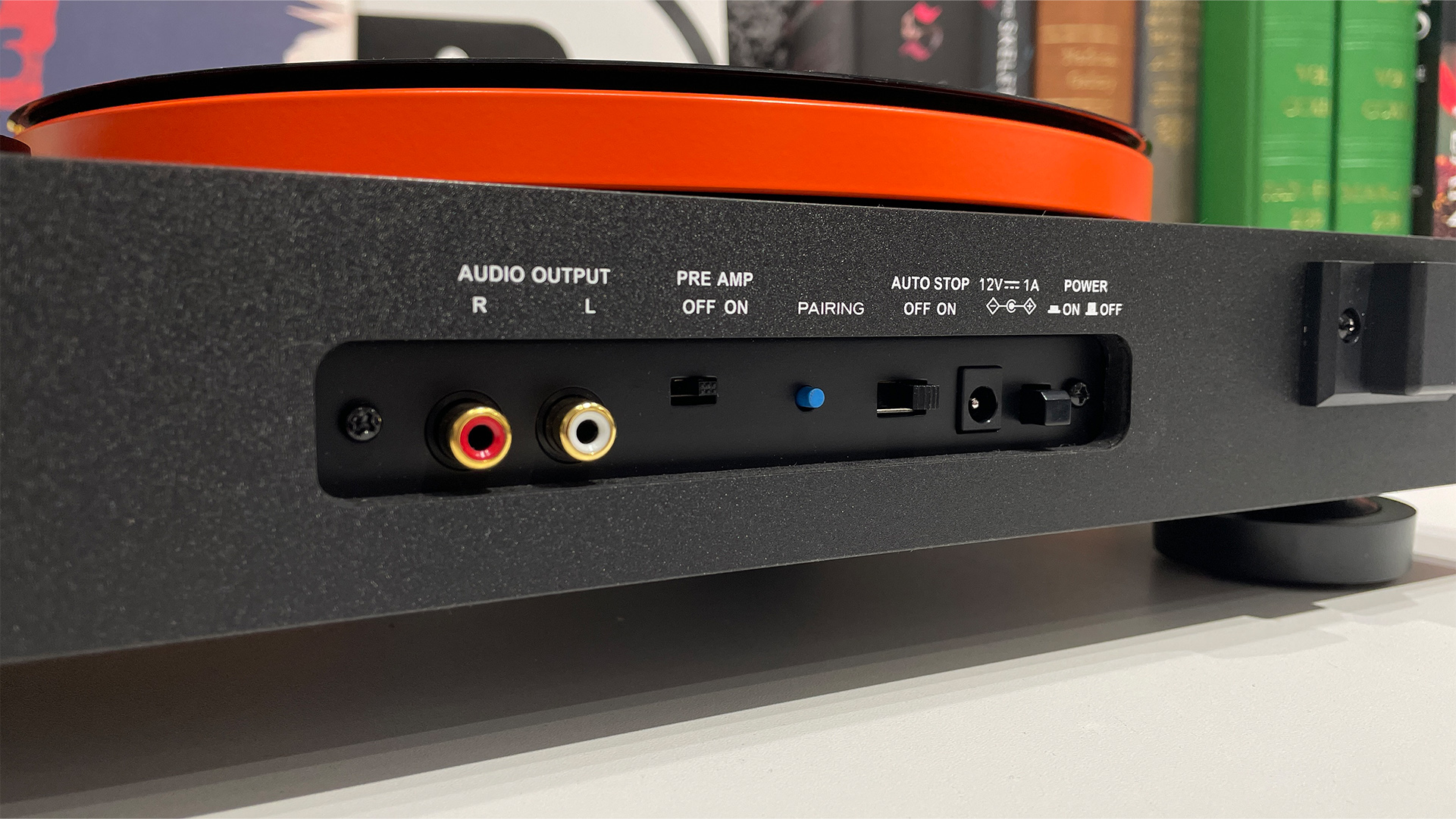
The front of the turntable also has buttons for selecting speed (the deck supports both 33⅓ and 45rpm). They’re a nice size, smooth to the touch and remind us of the buttons we’ve seen on recent hi-fi separates from Arcam (one of JBL’s stablemates). Coincidence?
On the rear of the deck are the power button, auto start/stop switch and a pair of analogue outputs. There’s a pre-amp on/off switch which allows you to use either the turntable’s built-in phono stage with, say, a pair of active speakers or you can plug it into your stereo amplifier’s phono stage if it has one fitted. You’ll also need to have the pre-amp switch set to on when you want to start Bluetooth pairing. This is done by pressing and holding the Bluetooth button on the back for two seconds.
It’s a bit of a leap of faith as there’s no display to show you exactly what you’re connecting to, but we managed to get the JBL paired to both an Audio Pro C20 wireless speaker and a pair of Bose QuietComfort Ultra Headphones with minimal fuss. Just remember you’ll need to make sure the device you’re not using is powered off to ensure there’s no confusion.
The JBL Spinner BT supports Bluetooth 5.2 and aptX HD which means it’s capable of wirelessly transmitting 24-bit high-resolution audio to compatible kit. Theoretically, this should improve the wireless sound quality through your Bluetooth speaker or headphones. However, remember, there’s a serious amount of encoding and decoding going on in the chain when you’re using a Bluetooth turntable and there will be a limit on the quality you can achieve.
Sound
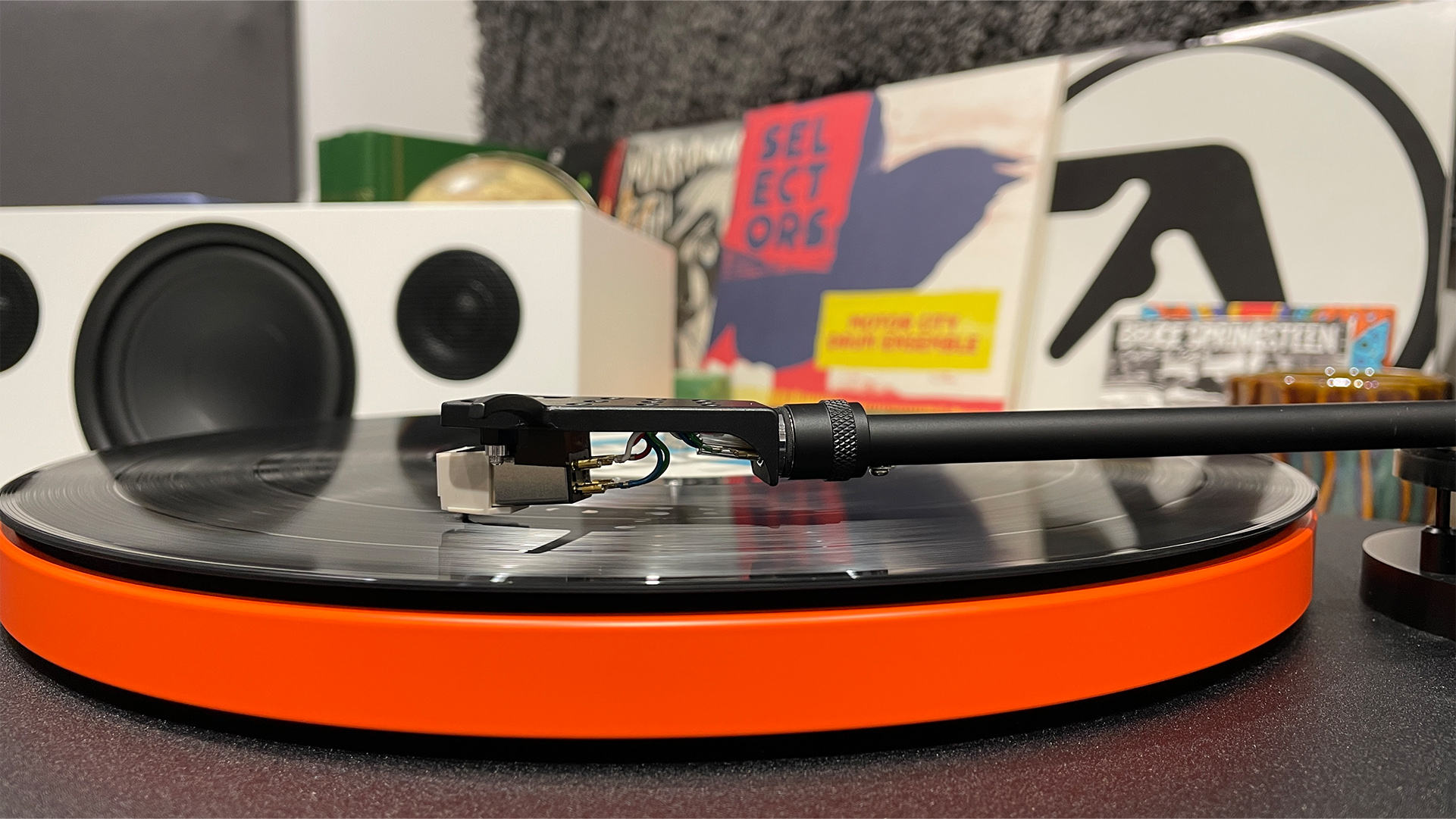
We slot the Spinner BT straight into a system which we think is suitable, taking into account the JBL’s price tag. The Arcam A5, our current favourite stereo amplifier, provides the muscle and a moving magnet phono stage. For speakers, we opt for the tried, tested and much-loved KEF LS50 Meta standmounters.
Playing New Sensation by INXS, the JBL is off to a good start. During those first few seconds the turntable settles straight into a groove – the energetic electric guitar and vibrant drums hit hard with nicely defined edges and the track drives along with a good sense of rhythm. You’re also presented with a large soundstage with a fine sense of spaciousness around the band’s instruments and the Australian twang of Michael Hutchence’s lead vocal as he launches into life.
Similarly with Mars from Holst's The Planets, the JBL does a good job of capturing the drama and rollercoaster of dynamics and emotions that the track delivers. There’s a pleasant tone across the board with a good sense of texture from the sweeping strings to the regimented hits of the timpani drum. Low frequencies don’t sound too thick, or lightweight, and nor does it thrash out highs with reckless abandon. In this regard, the Spinner BT is well-behaved.
While we’re using the Arcam’s phono stage, we swap decks to the similarly priced and five-star Rekkord Audio F110. It’s a fully automatic deck but doesn’t have Bluetooth functionality or a built-in phono amp. Compared to the JBL it gives you a little more across the board. We find it sounds more confident and composed. There’s an even greater sense of musicality with elements flowing even more naturally.
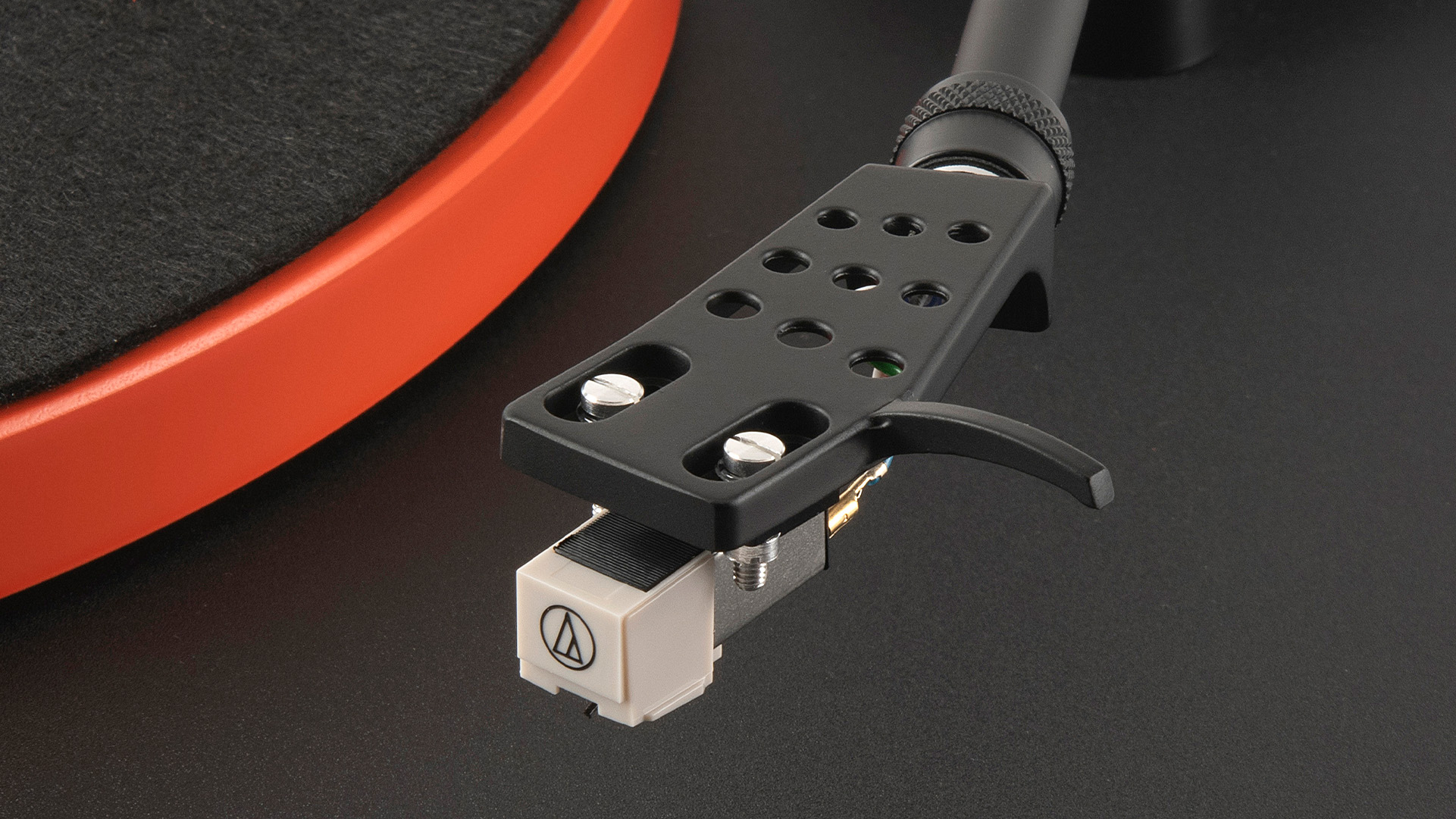
After that comparison, we switch over to using the JBL’s built-in phono stage and perhaps unsurprisingly, notice a drop-off in terms of performance. During those opening few seconds of New Sensation, the JBL sounds a little slow out of the blocks. Listen for longer and it becomes apparent that the rhythmic drive of the track has dropped a gear or two which slightly hinders your ability to connect with the music. It takes some of the edge off what was previously a lively and upbeat presentation. This is something just to bear in mind if you’re planning on plugging the deck straight into a pair of active speakers, or if your current stereo amp doesn’t have a good quality phono stage of its own.
Switch to Bluetooth playback through the Audio Pro C20 and there aren’t really any surprises. Of course the soundstage is completely different from what you get from a pair of stereo speakers and the audio does sound more compressed. But once again, the turntable’s even-handed balance helps it deliver a perfectly listenable sound. The bassline to Michael Jackson’s Billie Jean treads along nicely and there’s sufficient detail extracted.
The sense of dynamism on display is about what we’d expect when faced with the technology at our disposal. It’s more of a background listening experience than an occasion to do any critical listening. And it’s the same when listening through the Bose QuietComfort Ultra Headphones. The JBL executes what is expected of it and does it to a solid enough standard.
Verdict
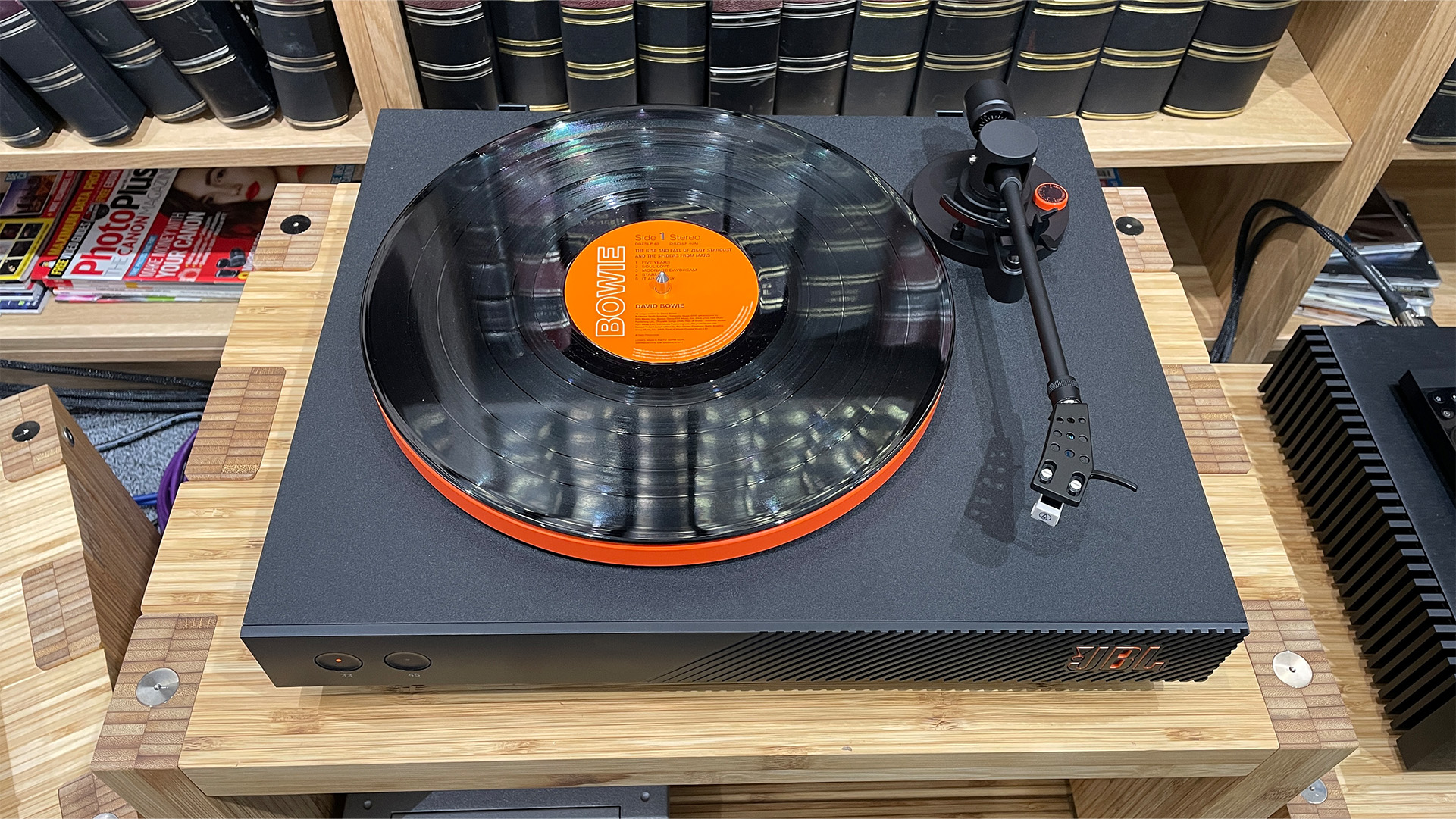
We think casual listeners who want to dust off their record collections and revisit them via a Bluetooth speaker or wireless headphones will find a deck like the JBL Spinner BT an appealing prospect. Similarly, if you’re a wireless speaker/headphones user who wants to dabble in vinyl for the first time, and don’t want to get into the world of separates (or at least not right now), a versatile deck like the JBL will help you enjoy the old with the new. If the vinyl revival continues we can only see more decks like the JBL appearing on the horizon.
SCORES
- Sound 4
- Build 4
- Features 4
MORE:
Read our review of the Sony PS-LX310BT
Also consider the Audio-Technica AT-LPW50BTRW
Best record players: the best turntables tested and reviewed for every budget
What Hi-Fi?, founded in 1976, is the world's leading independent guide to buying and owning hi-fi and home entertainment products. Our comprehensive tests help you buy the very best for your money, with our advice sections giving you step-by-step information on how to get even more from your music and movies. Everything is tested by our dedicated team of in-house reviewers in our custom-built test rooms in London, Reading and Bath. Our coveted five-star rating and Awards are recognised all over the world as the ultimate seal of approval, so you can buy with absolute confidence.
-
Rui to avoid saying , not good or barelly a turntable, it turns and it´s a table but the sound is not a improvement , not better than hundreds of thousands already existing or existed,Reply
or if you have classic wooden furniture with some parts in orange this will look fine as i had a couch in cloth and the main colour was orange so i bought the JBL speakers from my father ,the L100
